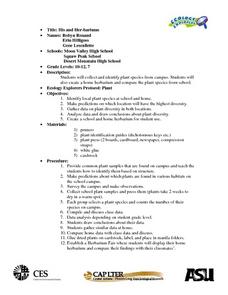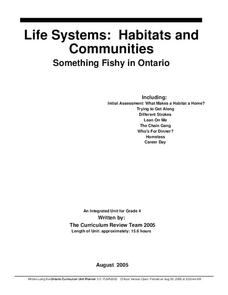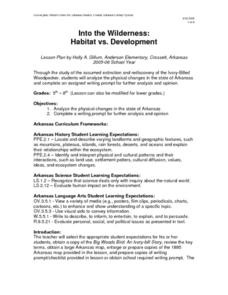Howard Hughes Medical Institute
Lesson 7: Observations Across Habitats
How are animals in separate but nearby habitats related? Ecology scholars compare the animal inhabitants of the Gorongosa National Park in part seven of an eight-part series. Learners study photos from two different habitats, then...
Curated OER
Adaptations to Niches and Habitats
Life science learners measure and record traits of seeds, leaves, and their own hands and then graph the data to find a continous distribution curve. They compare and color diagrams of seven different animals' forelimbs (not included),...
Curated OER
Introducing Habitats and Biodiversity
Students identify habitats in Arizona. Theys define and illustrate a food web, and explain the importance fo biodiversity.
Curated OER
Habitat Basics
First graders get out and explore two different habitats to examine how each one meets the needs of the plants and animals that dwell there. They discuss what they've learned about animal habitats as they explore the outdoor environment....
Curated OER
African Animals in Habitats
Students investigate animal habitats in zoos. In this animal habitat lesson, students fill in a KWLH chart about zoos before looking at pictures of African animals in zoo habitats. They discuss what they see and take a field trip to the...
BioEd Online
Butterflies in Space
How does gravity affect the life cycle of a butterfly? Learn first-hand what types of investigations astronauts perform in space by following along with one of NASA's experiments. Create butterfly habitats in the classroom with specific...
Curated OER
Happy Habitats
Students explore different habitats. For this habitat lesson, students investigate four different habitats through participating in a WebQuest. Students create an animal web using Kidspiration or a video documentary upon completing the...
California Academy of Science
Coral and Chemistry
Using cabbage juice as a pH indicator, future scientists explore the effect of increasing carbon dioxide on the pH of the ocean and relate it to the health of coral reefs. Ideal for an earth or environmental sciences course, this lesson...
Purdue University
Design of a Reindeer Habitat for an Indiana Zoo
What would Rudolph ask for in his ideal home? Pupils analyze the characteristics of the reindeer to create their perfect zoo habitats. A STEM lesson focuses on the design of the habitat while factoring constraints such as space, diet,...
National Wildlife Federation
Night Friends - American Bats
Bats are a misunderstood species. Pupils learn about the characteristics of bats in a three-part lesson. They begin by examining the adaptations of different types of bats, then explore the misconceptions humans have about the species....
Cornell Lab of Ornithology
Jump, Glide, or Fly? Exploring Bird Evolution
How have birds evolved from prehistoric animals? With the three-part lesson, small groups first research different prehistoric animals and determine whether they are birds. Then, scholars explore different bird adaptations using the Flap...
Curated OER
Ocean Habitats
Students examine the water samples from a demonstration and discuss the difference between fresh and salt water. They draw different animals that live near or in the ocean and how humans can harm the ocean habitat. They draw pictures of...
Curated OER
Animal Habitats
Students explore animal lifestyles by researching their characteristics. In this animal habitat lesson, students read the story Over in the Jungle and analyze the animal illustrations in the book. Students create clay animal characters...
Curated OER
Science: Her-bariums Galore!
Learners collect and identify plant species and construct herbariums both at school and at home. By gathering data from both locales, they draw conclusions and make predictions about plant diversity. Upon completion of the exercises,...
Curated OER
WET Science Lesson #3: Comparison of Aquatic and Terrestrial Plants
Elementary life science explorers compare and contrast aquatic and terrestrial plants (elodea and soybeans) in a Venn diagram. Some background information is provided to support direct instruction, and general instructions are provided...
Curated OER
Habitats
Students investigate the habitats of living things and the cycle of the food chain. In this scientific inquiry online lesson, students examine the habitats of plants and animals as well as the food chain as they sort pictures of living...
Curated OER
Marine & Aquatic Habitats Activities - Habitats of Birds, Fish, and Mammals on the Island and the Pacific Region
Young scholars create habitats in jars to understand integral aspects of plants' and animals' habitats.
Curated OER
Exploring Habitats
Third graders go on a mission to research three different habitats on the campus of Manchester College so that they can be part of a resuce effort. They work in groups and each group starts at a different habitat. Group one starts at...
Curated OER
Something Fishy in Ontario
Students create a diorama of the habitat of the fish of their choice, along with a research paper. They research habitats, the factors which affect specific habitats, and how fish adapt to different habitats in order to meet their unique...
Curated OER
Into the Wilderness: Habitat vs. Development
By studying the once-assumed extinction, then rediscovery of the Ivory-Billed Woodpecker, learners look at the physical changes that have occured in habitats throughout Arkansas. This outstanding lesson is chock full of terrific...
Curated OER
Carrying Capacity
Young biologists identify how plants and animals are affected by changes in their ecosystem and environment. The concepts of succession, maintenance of habitats, interrelationships, and adaptation are all discussed. This...
Curated OER
Taking Count of Biodiversity
Here is a well-designed lesson on biodiversity that should intrigue your charges. In it, pupils compare a natural desert area to a school field to see how habitat destruction affects species diversity. Groups set up transects and collect...
Curated OER
Exploration of 'pill bugs'
Fifth graders define words. They create a dichotomous key. After carefully examining pill bugs, 5th graders record observations. They compare and contrast habitats of pillbugs.
Curated OER
Marine & Aquatic Habitats Activities - Tidal Pools
Students analyze the survival needs of different organisms and the conditions in a particular area that can affect these survival rates.
Other popular searches
- Elementary Science Habitats
- Life Science Habitats
- Ks2 Science Habitats
- Desert Habitats Science
- Esl Lessons Science Habitats
- Science Habitats Lesson























